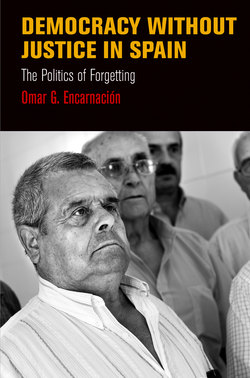Democracy Without Justice in Spain

Реклама. ООО «ЛитРес», ИНН: 7719571260.
Оглавление
Omar G. Encarnacion. Democracy Without Justice in Spain
Отрывок из книги
Democracy Without Justice in Spain
Bert B. Lockwood, Jr., Series Editor
.....
A more general criticism of reconciliation is that it is a very poor substitute for justice. By and large, this criticism reflects the structural nature of truth commissions. These bodies are generally defined as much for what they do—to establish the “official” truth about specific historic events—as for what they do not do (see Rotberg and Thompson 2000; Rosenberg 1996; Hayner 2001). Truth commissions usually lack the power to punish or prosecute human rights abusers; they also are seldom empowered to implement whatever recommendations are issued in the final report. The extent to which recommendations for reforms and reparations made by a truth commission make it into law is usually left to the discretion of the politicians, who often have little incentive to see them implemented since this often entails significant political risks. All of this has led many to downgrade expectations about what truth commissions can actually accomplish. Ignatieff (1996: 112) writes that, at most, truth commissions can be expected “to reduce the number of lies that can be circulated unchallenged in public discourse.”
Another criticism of reconciliation is whether the ambitious objective of creating a national narrative about the past that is supported by a broadly shared collective memory about historical events is of actual use to democracy. As observed by Müller (2002: 19), “In the end we may have to accept that contested, conflicting, and competing memories are an inevitable legacy of transitions to democracy. But that in itself might not be such a bad thing; after all, democracy itself is a form of contained conflict—and as long as memories remain contested, there will be no simple forgetting or repression tout court.” Müller adds (19) that “rather than aiming for some elusive social consensus in which one narrative of the past is enthroned, arguing about the past within democratic parameters and on the basis of what has been called an ‘economy of moral disagreement’ might itself be a means of fostering social cohesion.”
.....